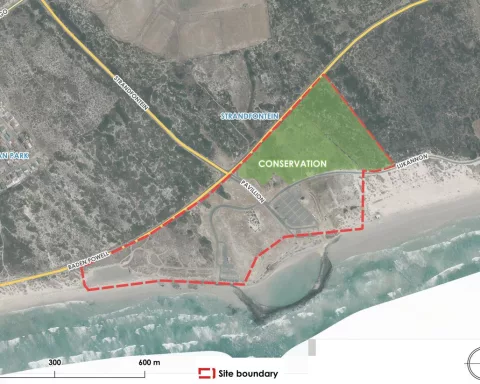Cape Town has announced a massive R120 billion infrastructure project pipeline that includes investments of R43 billion over the next three years. The investment plans are expected to create 135,000 jobs and uplift low-income households and those residing in informal settlements. The city is committed to sustainability and inclusivity, with significant investments in water and sanitation, transportation, waste management, and affordable housing. Cape Town’s infrastructure investments herald a new era of prosperity for the city’s inhabitants and solidify its status as a hub of national economic growth.
Cape Town has announced a bold R120 billion decade-long infrastructure project pipeline, outdoing its metropolitan counterparts. The city’s investment plans amount to R43bn in the coming three years, a figure that trumps the combined investments of Johannesburg and Durban. The infrastructure investments are predicted to spawn 135,000 jobs over a span of three years, excluding the indirect economic advantages. Cape Town’s pledge to social responsibility is manifest in the distribution of the infrastructure budget, with 73% of the record R11bn infrastructure budget earmarked to uplift low-income households and those residing in informal settlements.
Amidst the flurry of urbanisation, Cape Town is taking the reins of its fate. As it races towards becoming South Africa’s most populous city, Cape Town has embarked on an ambitious journey. The city has announced a bold R120 billion decade-long infrastructure project pipeline, as charted in the city’s latest annual Infrastructure Report, which is set to outdo its metropolitan counterparts. With its status as a hub of national economic growth solidified, Cape Town’s infrastructure investments herald a new era of prosperity for the city’s inhabitants.
A Vision for the Future: Unveiling of the Infrastructure Initiative
Cape Town’s infrastructure blueprint was rolled out at the City Council Chambers by Mayor Geordin Hill-Lewis on February 14. Hill-Lewis, with a determined eye on the future, emphasised that the city is securing its future by surpassing all other cities in infrastructure investment. The city’s investment plans amount to R43bn in the coming three years, a figure that trumps the combined investments of Johannesburg and Durban. Nedbank’s revised Capital Expenditure Project Listing for 2023 attests to the scale of Cape Town’s investments. It discloses that the city constitutes a whopping 60% of the R100 billion government infrastructure projects announced nationwide in the previous year.
As Cape Town’s population escalates towards the five million mark, the city is ardently working to balance economic growth and urban development. This commitment is evidenced by the creation of over 200,000 jobs in the preceding year, which dwarfs the combined job creation in South Africa’s other metropolitan areas. Additionally, the infrastructure investments are predicted to spawn 135,000 jobs over a span of three years, excluding the indirect economic advantages. The project’s value, however, transcends job creation. Enhanced infrastructure promotes individual dignity and communal pride, morphing the city into a beacon of hope for all residents.
Crafting a City of Hope: A Commitment to Social Responsibility
Cape Town’s pledge to social responsibility is manifest in the distribution of the infrastructure budget. A significant chunk, 73%, of the record R11bn infrastructure budget is earmarked to uplift low-income households and those residing in informal settlements. This attests to Cape Town’s aspiration: to mould a City of Hope for all denizens, irrespective of their geographical location or background within the city.
A deeper look into Cape Town’s infrastructure investment reveals its unwavering commitment to service delivery and sustainability. The city’s 2023/24 infrastructure capital budget outperforms both Johannesburg and Durban combined over a three-year medium-term budget framework. Cape Town’s capital budget is 91.2% larger than Johannesburg’s and a staggering 116.9% larger than eThekwini’s.
A Sustainable Future: Essential Services and Climate Resilience
Cape Town’s dedication to providing basic services is particularly evident in its ten-year pipeline budget allocation, with water and sanitation projects forming a significant 42% of the budget. The city is spearheading multi-billion rand upgrades to seven wastewater plants, reinforcing its commitment to a sustainable future. This audacious plan supports the city’s endeavour to curtail sewer spills, including a fourfold increase in sewer pipe replacement and substantial bulk sewer upgrades across the city.
In a world where mobility is increasingly important, Cape Town’s infrastructure plan also accommodates future transportation needs. The city has introduced substantial Urban Mobility projects into its 10-year pipeline, including a R21 billion investment for public transport improvements along three major corridors: Khayelitsha–Century City, Symphony Way, and Klipfontein. These corridors represent the upcoming long-term investments, succeeding the completion of the MyCiTi Phase 2A route, the largest infrastructure project currently in the Western Cape.
Cape Town is ambitious despite the complexity of its endeavour. A myriad of projects, from adding 300 million litres of water per day from new sources by 2030, to a R5.8 billion investment in road congestion relief projects over the 10-year portfolio, reflect the city’s commitment to its future. The city’s New Water Programme estimates that by 2040, approximately 25% of Cape Town’s water will originate from desalination, groundwater, and re-use.
Advancing Inclusivity: Affordable Housing and Waste Management
Cape Town’s infrastructure initiative also incorporates resilience against climate change. Approximately 40% of the city’s overall 10-year pipeline is dedicated to strengthening the city’s defences against drought, fires, heat, flooding, and storm surges. Concurrently, the city aims to integrate 650MW of independent power into the Cape Town grid by 2026/27, with a goal to add 1GW in due course, insulating the city from four stages of Eskom’s load-shedding.
The city’s waste management plan also deserves mention. A significant policy adjustment entails reducing the service radius of waste drop-off sites from 7 km to 3 km, with the intention to establish ten new waste drop-off facilities in the coming decade. Over the next ten years, an incredible 98% of Urban Waste Management investment will be funneled towards landfill-related projects.
Moreover, the city has allocated land for affordable housing, which is anticipated to produce 1,500 social housing units within a total yield of 3,300 units. This move highlights Cape Town’s commitment to inclusivity, ensuring that all residents, regardless of income, can access quality housing.
In conclusion, Cape Town’s R120 billion decade-long infrastructure project pipeline is a daring venture that strives to harmonise rapid urbanisation with sustainable and inclusive growth. The city’s future is being shaped by a pledge to construct an inclusive and resilient city – a city where every person, irrespective of their financial status or background, can flourish. Cape Town is striving to build this City of Hope, standing as a testament to its ambition to become a beacon of urban development on the African continent.
1. What is Cape Town’s infrastructure project pipeline?
Cape Town has announced a massive R120 billion infrastructure project pipeline that includes investments of R43 billion over the next three years. The investments are expected to create 135,000 jobs and uplift low-income households and those residing in informal settlements.
2. How does Cape Town’s infrastructure investment compare to other metropolitan areas in South Africa?
Cape Town’s investment plans amount to R43bn in the coming three years, a figure that trumps the combined investments of Johannesburg and Durban.
3. How is Cape Town’s infrastructure investment distributed?
73% of the record R11bn infrastructure budget is earmarked to uplift low-income households and those residing in informal settlements.
4. What essential services are included in Cape Town’s infrastructure plan?
Water and sanitation projects form a significant 42% of the budget, alongside multi-billion rand upgrades to seven wastewater plants.
5. How is Cape Town addressing climate resilience in its infrastructure plan?
Approximately 40% of the city’s overall 10-year pipeline is dedicated to strengthening the city’s defences against drought, fires, heat, flooding, and storm surges. The city also aims to integrate 650MW of independent power into the Cape Town grid by 2026/27, with a goal to add 1GW in due course.
6. How is Cape Town addressing affordable housing and waste management in its infrastructure plan?
The city has allocated land for affordable housing, which is anticipated to produce 1,500 social housing units within a total yield of 3,300 units. The waste management plan entails reducing the service radius of waste drop-off sites from 7 km to 3 km, with the intention to establish ten new waste drop-off facilities in the coming decade.












